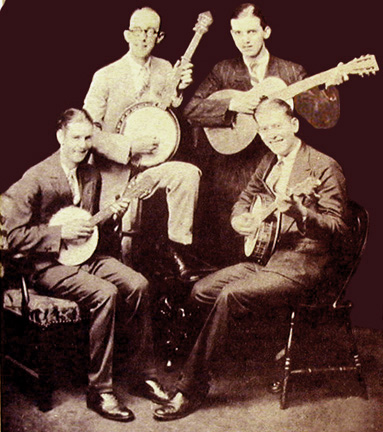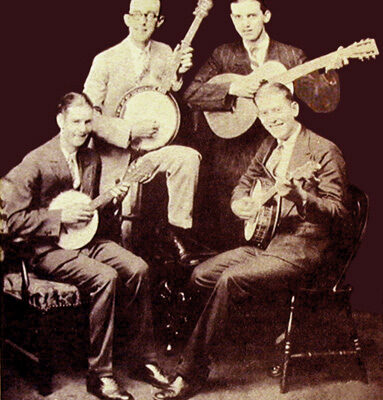The year was 1927. Charles Lindbergh became the first individual to fly solo across the Atlantic Ocean; famed New York Yankee slugger, Babe Ruth, hit sixty home runs in a single season; the Ford Motor Company ceased production of its “Tin Lizzie’ in favor of their highly popular Model T automobile; “The Jazz Singer” signaled the end of silent movies, ushering in the first motion picture with a sound track; and Nashville’s Grand Ole Opry launched its first radio broadcast.
In the spring of that same year, two relatively forgotten events occurred in Johnson City that would factor into the equation that eventually propelled a struggling unknown singer into the role as the “Father of Country Music.” His name… Jimmie Rodgers. Also known as “The Singing Brakeman” and the “The Blue Yodeler,” the singer would become the first nationally known star of country music, influencing future generations of wannabe vocalists. His career was succinct yet significant, cut short at age 35 after a losing battle with tuberculosis.
Jimmie’s brass plaque in the Country Music Hall of Fame proclaims “Jimmie Rodgers' name stands foremost in the country music field as the man who started it all.” The epitaph on his statue at the Jimmie Rodgers Memorial Museum in Meridian, Mississippi reads… “His is the music of America. He sang the songs of the people he loved, of a young nation growing strong. His was an America of glistening rails, thundering boxcars, and rain-swept nights, of lonesome prairies, great mountains and a high blue sky. He sang of the bayous and the cornfields, the wheated plains, of the little towns, the cities, and of the winding rivers of America.”
The then-struggling performer made two visits to Johnson City to take advantage of some opportunities afforded him by the city’s rich musical heritage. By this time, he and his wife, Carrie, were residing in Asheville, North Carolina, where he had become a regular entertainer over radio station WWNC.
Rodger’s first trip to Johnson City transpired soon after he became knowledgeable of the upcoming 52ndDistrict Rotary Clubs’ annual convention being held on April 24-26. As an added attraction, the service club featured entertainment.Upon arrival, the future “blue yodeler” was given an opportunity to perform on several entertainment programs being offered to the attendees during the three-day event.
In addition to Rodgers, numerous other talents arrived from across the area, including a very popular group from Bristol, the Tenneva Ramblers, choosing their abbreviated name from the fact that the city’s main street is divided between Tennessee and Virginia. The spirited group consisted of Claude Grant (lead vocals, guitar), Jack Grant (mandolin), and Jack Pierce (fiddle). Greatly impressed with this band, Jimmie invited the three young chaps to return with him to Asheville to broadcast over WWNC, giving the slightly embellished impression that he was rapidly becoming a celebrity. The Ramblers were overwhelmed at the thought of performing with Rodgers over radio; they reasoned the exposure would bring them fame and wealth.
However, the popular band had to decline Jimmie’s enticing offer because they were heavily booked with numerous musical venues across the region. Sensing the trio might later reconsider his offer, Rodgers gave them specific instructions on how to contact him after he returned to North Carolina. At the conclusion of the Rotary convention, the future superstar drove back to Asheville, returning to the airwaves with another performer, Otis Kuykendall. However, this two-person arrangement yielded very little listener support, resulting in low wages for the pair.
The “Singing Brakeman” was in a quandary, trying to find his niche to satisfy the craving appetites of a rapidly increasing number of country music fans. He began to lean heavily toward his roots, favoring basic folk or “hillbilly” music, a word that had become identified with this musical genre after Al Hopkins used it in January 1925 to name his Virginia-based string band. Rodgers was unaware that, at that precise moment, country music record pioneer, Ralph Peer of the Victor Talking Machine Company, was making preparations to record local area talent using a portable field unit.
After the Tenneva Ramblers finished their planned engagements, they hurriedly contacted Jimmie who told them the radio offer was still valid. Without haste, they packed their few belongings and headed toward Asheville in a worn-out jalopy, riding on slick tires and traveling over unpaved mountainous roads so steep, winding, and treacherous, they were almost impassable.

The Jimmie Rodgers Entertainers
Upon arrival, the Ramblers and Rodgers immediately acquired a new name: the Jimmie Rodgers Entertainers, firmly establishing the performer as the leader of the assemblage. Their radio stint would prove to be a brief one; the station bosses did not like the music they were playing and singing. Thus they began working anywhere they could find appearances, all the while earning a paltry income. Times were not good for the Jimmie Rodgers Entertainers.
In June 1927, the group made a second visit to Johnson City, this time attracted by news of an upcoming Trade Exposition and Tri-State Fair (now called the Appalachian District Fair). In the midst of the massive crowds and merriment was the promise of continuous musical entertainment… and money.
Rodgers’ big break came during a stop-over in Bristol with his group to visit their families. While strolling through downtown, he observed crowds of people lining up outside a vacant building on the Tennessee side of State Street, there to audition for Ralph Peer, who had selected Bristol as his site of operation. The train of opportunity the singer had been searching for had finally arrived.
When Jimmie approached his band members about auditioning for Peer, he unexpectedly found them somewhat disinterested, thinking they had nothing worthy of putting on wax. However, they agreed to it because of their dismal financial situation. Nonetheless, just prior to the try-out, the group became engaged in a heated argument over the name that would be used on any future records and summarily disbanded. The three Bristol boys quickly returned to their old designation, the Tenneva Ramblers, and auditioned separately for Peer.
Not to be deterred by the sudden loss of his band, Jimmie sang solo and was afforded the opportunity to record two songs: “”The Soldier's Sweetheart” and his future classic, “Sleep, Baby, Sleep,” receiving $100 for two hours and twenty minutes of studio work. Without even realizing it, Jimmie was on his way toward superstardom, with appearances and additional recording contracts just around the corner. Sadly, he would have just six brief years to establish his legacy.
Had Jimmie Rodgers not come to Johnson City in 1927, not met the Tenneva Ramblers at the Rotary Club convention, not returned for the fair, and not visited Bristol with his band, it is quite possible that he would not have known about or had the opportunity to participate in the now famous “Bristol Sessions”.
Rodgers could have become just another country music hopeful in the annals of time, fading into obscurity, instead of achieving the prestigious title of the “Father of Country Music.” Bristol may claim most of the accolades for his monumental success, but Johnson City justifiably deserves at least a share of the credit.
